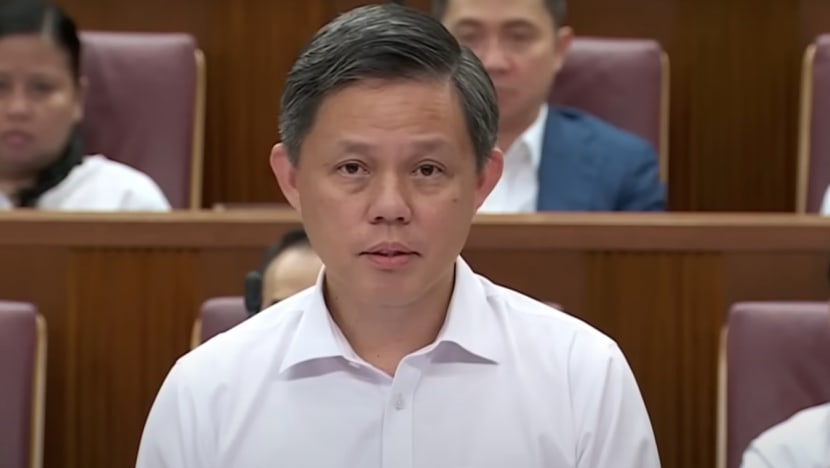Civil servants cannot retain gifts over S$50, same 'spirit' applies to political office holders: Chan Chun Sing

Minister of Education Chan Chun Sing speaking in Parliament on Aug 2, 2023.
- Civil servants cannot retain gifts worth S$50 or more, unless they pay the market value of the gift to the government
- Minister-in-charge of the Public Service Chan Chun Sing reiterated this rule in a speech in Parliament on Wednesday (Aug 2)
- He added that political office holders adopt a “similar spirit and principles” in their official activities
SINGAPORE: Civil servants cannot retain gifts worth more than S$50, unless they pay the market value of the gift to the government, said Minister-in-charge of the Public Service Chan Chun Sing.
Mr Chan was reiterating the public service rules surrounding gift and meal invitations in a speech in parliament on Wednesday (Aug 2) in response to a question filed by Mr Gerald Giam, Member of Parliament (MP) for Aljunied Group Representation Constituency.
In his response, Mr Chan said that political office holders adopt a “similar spirit and principles” in their official activities and there are specific rules spelt out in the Code of Conduct for Ministers.
WHY IT MATTERS
The issue surrounding political office holders’ and civil servants’ acceptance of gifts and meal invitations has come under the spotlight amid a Corrupt Practices Investigation Bureau (CPIB) probe into Transport Minister S Iswaran and tycoon Ong Beng Seng.
Last month, CPIB revealed that it had arrested Mr Iswaran as well as Mr Ong, managing director of Hotel Properties Limited, in relation to the graft probe.
Mr Iswaran, who is on leave of absence, had worked closely with Mr Ong to launch the Formula 1 Grand Prix in Singapore.
GIFTS AND HOSPITALITY
Mr Chan said the rules for the civil service on accepting gifts and hospitality are designed to “maintain incorruptibility”, and prevent its officers from becoming “beholden” to any person or organisation.
Under these rules:
- Civil servants must declare to their Permanent Secretaries any gifts they receive from external stakeholders on account of their official position or work
- For gifts valued below S$50, officers can retain these if doing so does not affect the “integrity” of the civil service
- For gifts valued above S$50, officers who wish to retain these must pay the assessed market value of the gift to the government
MEAL INVITATIONS
Public officers may accept meal invitations from local or foreign stakeholders when there are legitimate work-related reasons, or when it is “impractical or impolite to reject” the meal, said Mr Chan.
As the value of a meal is more difficult to ascertain than a gift, civil servants should declare and seek approval from their Permanent Secretaries if they receive any such meal invitation.
Officers should make this declaration before the meal — or, if that is not possible — immediately after the meal.
This is especially if the officer assesses that the value of the meal or hospitality is “incongruent” with the professional nature of the meeting and may “give rise to perceptions of influence peddling and conflict of interest”, whether real or perceived, said Mr Chan.
He added that civil servants are “sensitised” on these matters, that even when they receive gifts of fruits or sweets — as is customary on many festive occasions — such gifts are usually distributed in the agency or to a community organisation.
“We do not keep them.”
GIFTS FOR POLITICAL OFFICE HOLDERS
Mr Chan added that political office holders follow the same principles as civil servants in their official activities.
This means:
- In general, all gifts should be refused and returned to the donor without delay
- If the return of the gift is impractical, the gift must be handed over to the political office holder’s ministry to be dealt with in accordance with official guidelines
- If political office holders want to retain a gift, they have to pay the government for it at the valuation price
- If they do not, the gifts will have to be surrendered to the government
Related:
CODE OF CONDUCT FOR CIVIL SERVICE
Mr Chan also responded to various MPs’ questions on the Code of Conduct which public service officers have to abide by.
He said that in the course of their work, public officers may come across different requests, be it from colleagues, friends, members of the public, or political office holders.
“When handling these requests, officers are expected to maintain a high level of professionalism, and safeguard the confidentiality of official information, as well as the political impartiality of the public service,” he said.
Should an officer be unsure of a request because it seems inappropriate or unrelated to official work, he should consult and seek guidance from his supervisor.
And if the request comes from a supervisor or a more senior officer, the officer can escalate the matter appropriately through the chain of command — including directly to the permanent secretary, the head of the agency, the head of civil Service, or the Minister-in-charge of the Public Service.
Mr Chan added that the Code of Conduct is reinforced through various channels such as annual quizzes, declarations, induction programmes for new entrants and regular reminders.
This article was originally published in TODAY.



















